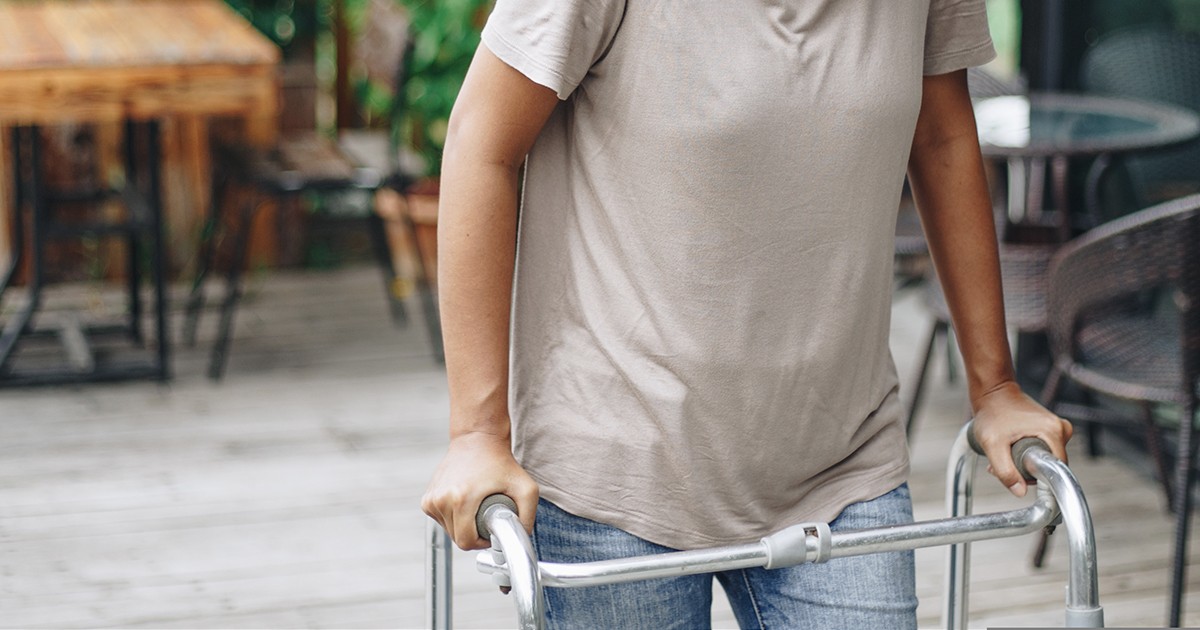
By Audrey Wick
“You’ll feel like an 80-year-old woman for a while,” said the neurosurgeon at my first post-op appointment after a brain aneurysm at age 39. He explained that, as I regained strength and mobility, I would start to age backward until I’d eventually feel like myself.
“Like Benjamin Button.” I nodded in understanding. This was a comparison I could grasp. As a college writing and literature professor, I knew the F. Scott Fitzgerald short story whose main character was popularized by actor Brad Pitt in the film version of “The Curious Case of Benjamin Button.” Until this moment, though, aging backward had been fiction.
Now, a doctor was telling me it was reality.
I had three brain surgeries in less than a threeweek period while in a neurological intensive care unit. Many of those days were dark. At my worst, I collapsed mere inches from the bed when trying to walk. I vomited the liquid potassium that was supposed to give me strength. Crippling leg pain stole my sleep, leading to hallucinations. My hair was so damaged from lying against a pillow that it fell out in clumps. I wanted to read, but I could manage little more than the food services dining menu without feeling completely spent.
My head felt like it was bruised from the inside.
“It is,” a nurse told me, tenderly calming me when I couldn’t even grip my fingers around a drinking glass.
My aneurysm made me feel old—even older than age 80. The ever-present pain never subsided; it would only crest and recede, like varying degrees of a tidal wave.
My body wouldn’t always obey my mind when it came to everyday tasks, like when I was too weak to brush my teeth and was offered an ICU version of a toothbrush: a lollipop-style plastic stick with a small square sponge on the end that was dipped in mouthwash. Soberingly, I accepted it.
Each day, I tried to focus on a new goal: using a real toothbrush, sitting in a chair, walking, finally dressing myself.
Eventually, I was able to be discharged, and I made it a goal to take my final steps out of the hospital without a walker. Although I still needed one at times, I was determined to leave on my own two feet, a much different exit than my entrance had been, which was via air ambulance carried in by emergency personnel.
Once I was out of the hospital, I could think of my life like Benjamin Button’s. After all, I hadn’t forgotten what being in my thirties felt like, though it was going to be a long road to get there. Daily movements were strained. Eating was slow. Showering was a chore. I was dipping my toe into a larger pool of understanding, and while I couldn’t claim to know all versions of aches and pains, I was experiencing things differently by living with accelerated aging.
I was also learning to re-think my preconceived notions of improvement. Recovery was going to be a marathon, not a sprint.
Connecting with the fictional character of Benjamin Button was the grace I needed. I was patient with myself, and I tried to remain kind to my body. Giving myself permission to “age backward” wasn’t something most people understood. Once the surgeries are over, others often think “You’re fixed!” What they don’t see is the struggle: in my case, it was the physical and emotional trials as I crawled back to normalcy.
Recovery became my job. And it was a full-time one. I couldn’t drive, and I had no interest in crowds and noise. Energy levels were zapped, and I napped daily. Nursing residual head spasms, tending to surgery scars, and minimizing body aches filled my days.
Gradually, the pain lessened, and I started having more good days than bad. I looked forward to each morning instead of dreading it, feeling less like an octogenarian as the weeks passed. Sleeping most of the night became a reason to celebrate because that meant I was getting better. Waking up with an appetite made me feel 70. After a hearty laugh, I might feel 65. A buzz from coffee made me feel even younger. Experiencing different sensations allowed me to be a keen, pseudo-participant of various ages.
Since that conversation with my neurosurgeon, I’ve had Benjamin Button birthdays. Some have been quick to come, others have been a slog. But my curious case of growing younger has been an incredible gift, one that has put me more carefully in tune with life. Not just of my own, but of others’ lives. While I thought of myself as sympathetic before, I could now empathize. My experience has given me snapshot exposure to what future decades will be like for me—and what they are already like for those around me whom I love.
Grace is needed when it comes to how society approaches aging and how we help others around us navigate its challenges. That’s my biggest takeaway from this experience, curious as it may be.
As I continue in recovery, I look forward to getting closer to my life before the aneurysm, birthday by birthday. But, like Benjamin Button, I won’t forget the years I’ve glimpsed.